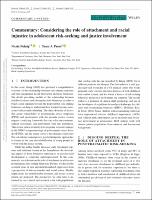Please use this identifier to cite or link to this item:
https://hdl.handle.net/20.500.12202/10067| Title: | Commentary (Invited): Considering the role of attachment and racial injustice in adolescent risk-seeking and justice involvement. |
| Authors: | Nehrig, Nicole Prout, Tracy A. https://orcid.org/orcid-search/search?searchQuery=tracy%20prout |
| Keywords: | racial injustice adolescent risk‐seeking justice involvement early trauma exposure self-destructive & risky behaviors attachment behavior juvenile justice risk taking trauma childhood adversity Adolescent psychopathology Diversity Mental health Posttraumatic Stress Disorder (PTSD) test construction adolescent behavior anxiety disorders |
| Issue Date: | Sep-2019 |
| Publisher: | United Kingdom : Wiley-Blackwell Publishing Ltd. |
| Citation: | Nehrig, N., & Prout, T. A (2019). Invited commentary: Considering the role of attachment and racial injustice in adolescent risk-seeking and justice involvement. Clinical Psychology: Science and Practice 26(e12289), 1-4. doi:10.1111/cpsp.12289 |
| Series/Report no.: | Clinical Psychology: Science and Practice;26(e12289) |
| Abstract: | Comments on an article by P. K. Kerig (see record 2019-17546-001). In this issue, Kerig (2019) has provided a comprehensive overview of the relationship between early trauma exposure and later engagement in self‐destructive and risky behaviors. She details prevailing models of the relationship between childhood trauma and subsequent risky behaviors in order to build a clear argument toward the proposal that risk‐seeking behaviors can help us understand how trauma becomes associated with juvenile offending. The sheer diversity of factors that create vulnerability to posttraumatic stress symptoms (PTSS) and involvement with the juvenile justice system requires a unifying framework that can aid in measurement, clinical assessment, and intervention with this population. This review article is timely in its response to recent changes in the DSM‐5 symptomatology of posttraumatic stress disorder (PTSD), and the author covers a broad range of literature that can inform contemporary psychotherapeutic approaches to trauma in the care and rehabilitation of young people involved with the justice system. Kerig brings together a wide body of literature to reveal the direct impact of trauma on adolescent risk‐seeking and justice involvement. Her argument is rooted in science and has important implications for treatment and future research. However, it can benefit from person‐centered, attachment‐ based, and intersectional perspectives. This commentary seeks to add to the view advanced by Kerig in order to further elaborate the phenomenological and social justice context. When empirical research is paired with developmental science of attachment and a critical and intersectional perspective, it has an even greater potential to transform communities, interrupt the cradle to prison pipeline, and provide healing from trauma and oppression. (PsycInfo Database Record (c) 2022 APA, all rights reserved) |
| Description: | Comment / Reply |
| URI: | https://www.researchgate.net/publication/333361173_Commentary_Considering_the_role_of_attachment_and_racial_injustice_in_adolescent_risk-seeking_and_justice_involvement https://hdl.handle.net/20.500.12202/10067 |
| ISSN: | 0969-5893 (Print) 1468-2850 (Electronic) |
| Appears in Collections: | Ferkauf Graduate School of Psychology: Faculty Publications |
Files in This Item:
| File | Description | Size | Format | |
|---|---|---|---|---|
| Prout 2019 OA Commentary_Considering_the_role_of_attachment_.pdf | 653.79 kB | Adobe PDF |  View/Open |
This item is licensed under a Creative Commons License

